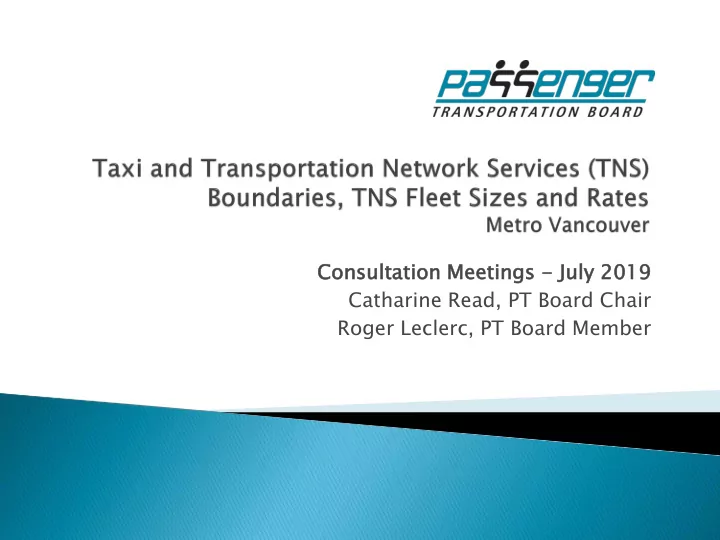

Consul ultation M n Meeting ngs - July 2 2019 Catharine Read, PT Board Chair Roger Leclerc, PT Board Member
Introductions and Agenda Background Presentation Discussion Items ◦ Boundaries ◦ TNS Fleet Size ◦ TNS Rates Other Items Next steps July 2019 Consultations 2
Section 28 of the Act states that the Board may approve an application after considering whether: ◦ there is a public need for the service the applicant proposes to provide; ◦ the applicant is a fit and proper person to provide the service and is capable of providing the service; ◦ the application if approved would promote sound economic conditions in the passenger transportation business in the province. July 2019 Consultations 3
Increased flexibility for the Board in making decisions concerning public need for the service and sound economic conditions Move to better evidence based decision making Board has sole authority to set operating areas, fleet sizes and rates for Taxis and TNSs Changes to terms and conditions of licence July 2019 Consultations 4
A Select Standing Committee on Crown Corporations (SSCCC) inquiry into ride hailing concluded there was a need for ride-hailing in BC within a provincial regulatory framework A report entitled Modernizing Taxi Regulation, by Hara and Associates concluded there was a shortage of taxis Debates on and the passage of the Passenger Transportation Amendment Act, fall 2018 A second SSCCC inquiry into TNSs, recommending no boundaries Extensive media coverage on the need for TNSs July 2019 Consultations 5
The TNS business model is provided with the opportunity to be viable and meet public need for the service Negative impacts on taxi stakeholders associated with the introduction of TNSs should be minimized where possible Policies will be based on defensible research Meaningful consultation with those directly impacted will occur Certainty and transparency will be provided in the policies on sound economic conditions The Board must move to better use of origin / destination and performance indicator data in making decisions and monitoring the impacts of decisions July 2019 Consultations 6
With all the options, the following occurs: if flexible pricing is allowed for TNSs, peak period service will improve off peak periods will result in lower rates for a TNS and there will be some customers who will then use more of the service there is more choice for consumers there will be more employment opportunities for drivers July 2019 Consultations 7
Pros: The public would experience faster and more reliable service at peak times Cons: Large reduction in licence-share values for taxi companies and licence-share holders. Some negative financial impact on lease operators. The relative difference between taxi licence- share values in different operating areas will be retained Some trip refusals will remain and will affect both TNS and taxi users Deadheading will continue for taxis and will occur for TNSs Some municipalities unlikely to be served by TNSs July 2019 Consultations 8
Pros: o The public would experience faster and more reliable service, including at peak times. Service very likely better than under Option 1 as this will attract more TNS companies o Potential TNS service to smaller Metro Vancouver municipalities Cons: o Large reduction in licence-share values for taxi companies and licence-share holders. Some detrimental financial impact on lease operators. The difference between taxi licence-share values in different operating areas will be retained o Some trip refusals will remain for taxi users o Deadheading continues for taxis July 2019 Consultations 9
Pros: o The public would experience faster and more reliable service, including at peak times. TNS and taxi service much better for City of Vancouver o Trip refusals by taxis and TNSs reduced o Deadheading reduced for taxis and TNSs Cons: o Disproportionately larger loss for City of Vancouver licence- share holders. Suburban taxis will also experience large reduction in licence-share values for taxi companies and licence-share holders. Some detrimental financial impact on lease operators. Given the joint impact of TNS competition and changes in operating areas, the likely result is a decline of licence-share values to negligible levels o Taxi service likely reduced for suburban areas July 2019 Consultations 10
Pros: The public would experience faster and more reliable service, including at peak times. Service may be better than under Option 2 Potential TNS service to smaller communities Cons: Large reduction in licence-share values for taxi companies and licence-share holders. Some detrimental financial impact on lease operators. The difference between taxi licence- share values in different operating areas will be retained Some trip refusals will remain for taxi users Deadheading continues for taxis July 2019 Consultations 11
Pros: May limit some of the reduction in licence-share values of taxis if fleet sizes set low Cons: Contrary to TNS business model Impossible to set a defensible limit as there is no data or modelling to assist with this in BC. No precedent in other jurisdictions to learn from May not meet public need for TNSs July 2019 Consultations 12
Pros: Provides some time to acquire data, assess the market for TNSs Cons: May not soften licence-share values drop July 2019 Consultations 13
Pros: May assist TNS drivers’ incomes Cons: Provides some leveling of the playing field for taxis May result in fewer people using TNSs July 2019 Consultations 14
Pros: Consistent with the TNS business model Cons: TNS drivers may not make minimum rates of pay July 2019 Consultations 15
Comments on Principles for Setting Policies Comments on Taxi and TNS Operating Areas in Metro Vancouver Comments on TNS Fleet Sizes Comments on TNS Rates in Metro Vancouver Other Concerns and Comments July 2019 Consultations 16
Catharine Read, PT Board Chair Roger Leclerc, PT Board Member
Recommend
More recommend